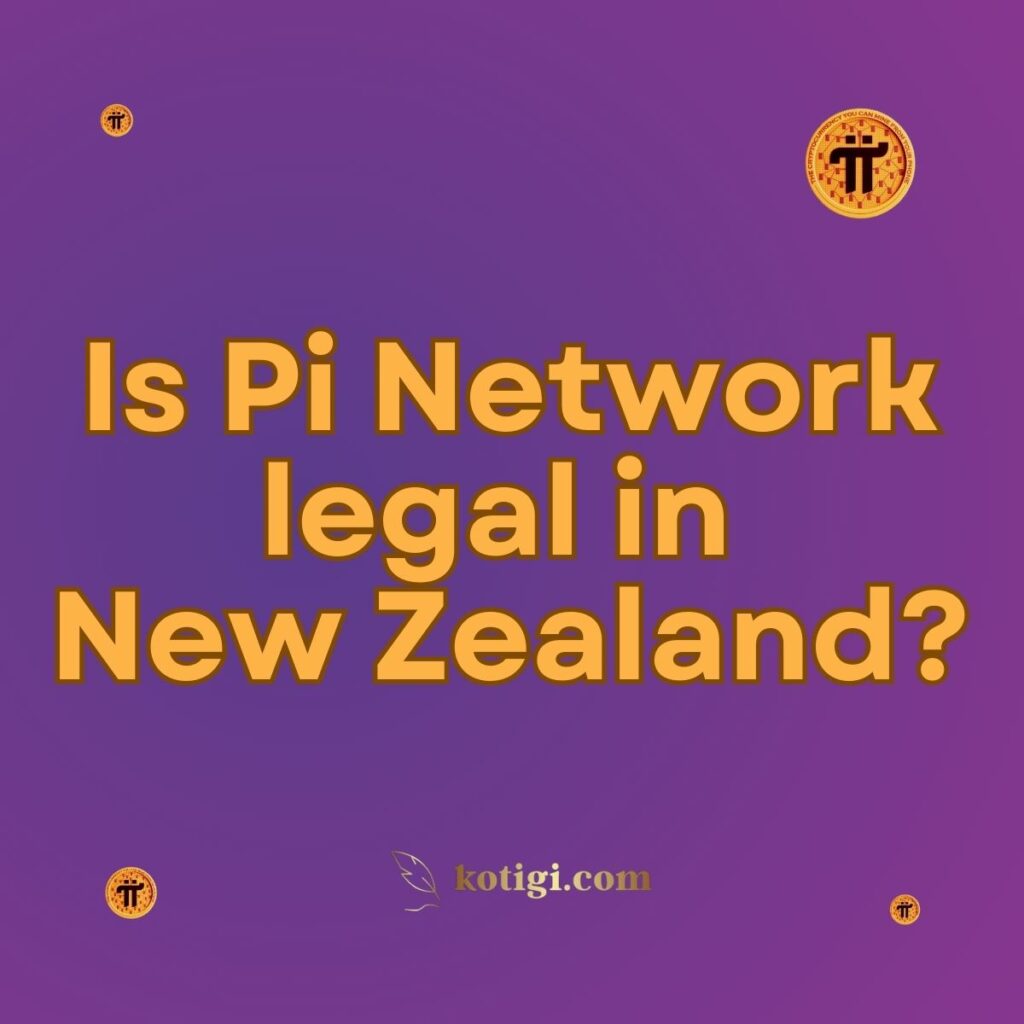
Is Pi Network legal in New Zealand?
Pi Network is legal in New Zealand, where no specific laws or regulations target the platform. However, like all cryptocurrencies, Pi Network operates in an unregulated market. Users should exercise caution and stay informed about potential regulatory developments in the cryptocurrency space as the government maintains a careful approach to digital currencies.
Introduction
As Pi Network grows in popularity, its legal standing across different countries becomes a key concern for participants. In New Zealand, the legal landscape surrounding cryptocurrencies remains largely undefined. While Pi Network is not banned, the regulatory framework for cryptocurrencies is still evolving, leaving users in a legal gray area. This article delves into Pi Network’s current legal status in New Zealand, the government’s approach to digital assets, and what users should consider when engaging with Pi Network in the country.
Cryptocurrency Regulation in New Zealand
No Specific Cryptocurrency Legislation
In New Zealand, there are no specific laws that directly govern the use of cryptocurrencies like Pi Network. The Financial Markets Authority (FMA) has issued guidelines and warnings related to the broader cryptocurrency market, but there are no explicit restrictions on Pi Network’s operations. As a result, New Zealanders are free to participate in Pi Network without breaking any laws.
However, due to the absence of cryptocurrency-specific legislation, users should be mindful that their participation is in an unregulated environment, which may lead to certain risks, particularly if they are new to digital currencies.
Government’s Stance on Digital Currencies
New Zealand’s government has maintained a cautious but open-minded approach to cryptocurrencies. The Reserve Bank of New Zealand (RBNZ) has acknowledged the growing interest in digital assets, but it also highlighted concerns regarding their use. These concerns include the risk of fraud, volatility, and the lack of consumer protections in the cryptocurrency space.
Pi Network, like other cryptocurrencies, is not regulated by the RBNZ or the FMA. The authorities’ main focus has been on educating the public about the risks involved in dealing with unregulated digital currencies, rather than enforcing restrictions or bans.
Pi Network’s Role in New Zealand’s Financial System
Pi Network’s Mobile Mining Model
Pi Network’s innovative mobile mining approach allows users to earn Pi coins by participating in the network on their smartphones. Unlike traditional cryptocurrencies, which require powerful computing hardware to mine, Pi Network’s model is more accessible and requires less energy.
In New Zealand, this model has not drawn any specific legal concerns, as Pi coins are not yet tradable on exchanges. However, once the Pi Network transitions to its open mainnet and coins become exchangeable, New Zealand authorities may revisit their stance on the platform to ensure it complies with any emerging regulations related to cryptocurrency exchanges.
Legal Considerations for Users
While Pi Network is legal, users in New Zealand should be aware of the risks that come with using unregulated platforms. The lack of oversight means that users may have limited legal protections if they encounter issues, such as loss of Pi coins, fraud, or disputes with the platform.
New Zealand authorities, particularly the FMA, have previously issued warnings about the risks of Initial Coin Offerings (ICOs) and cryptocurrency trading, emphasizing the importance of conducting thorough research and understanding the risks before participating in any digital asset platform, including Pi Network.
Legal Risks and Regulatory Developments
Lack of Consumer Protections
Since Pi Network operates in an unregulated market, users in New Zealand are exposed to risks due to the absence of consumer protections. In the event of platform-related disputes, fraud, or lost coins, users have limited legal recourse. This lack of oversight is a key concern for regulators, and it underscores the importance of caution when engaging with Pi Network.
Pi Network participants should understand that while they can freely use the platform, they do so at their own risk. As Pi coins become tradable in the future, regulatory attention may increase, leading to potential legal changes.
Potential for Future Regulations
As cryptocurrencies become more popular, New Zealand’s government may introduce new regulations to address the unique challenges posed by digital assets. The FMA and the Reserve Bank are already monitoring developments in the cryptocurrency space, and their future involvement could shape how Pi Network is regulated in New Zealand.
For now, there are no indications that New Zealand will implement strict regulations on Pi Network, but users should stay informed about potential legal changes that may impact the platform’s operations in the country.
Regional and Global Trends Influencing New Zealand
Cryptocurrency Regulation in the Asia-Pacific Region
New Zealand’s approach to cryptocurrency regulation is relatively light compared to other countries in the Asia-Pacific region. For instance, Australia has taken steps to regulate cryptocurrency exchanges, while China has banned cryptocurrency transactions outright. These regional trends may influence New Zealand’s future regulatory stance on cryptocurrencies, including Pi Network.
Pi Network users in New Zealand should be aware of these broader trends, as New Zealand could follow suit with more comprehensive regulations if the use of digital assets continues to rise in the country.
Global Cryptocurrency Regulatory Landscape
Globally, countries are grappling with how to regulate cryptocurrencies. For example, the European Union is moving toward clearer regulation with its Markets in Crypto-Assets (MiCA) framework, while the United States is gradually developing policies that balance innovation with consumer protection. These global trends are likely to impact how New Zealand approaches its own cryptocurrency regulation.
Pi Network users should keep an eye on international regulatory developments, as global shifts may lead New Zealand to take a more proactive stance on cryptocurrency oversight.
The Future of Pi Network in New Zealand
Potential Regulatory Challenges
As Pi Network evolves and its coins become tradeable, it could face new regulatory challenges in New Zealand. While the platform is currently legal, its operations may come under closer scrutiny once users begin exchanging Pi coins for traditional currency. At that point, New Zealand’s financial regulators may impose new requirements on the platform to ensure compliance with financial laws.
For now, Pi Network users in New Zealand can continue using the platform without legal concerns. However, they should be prepared for potential regulatory changes as the platform develops.
Importance of Staying Updated
Given the rapidly evolving nature of cryptocurrency regulation, Pi Network users in New Zealand should stay informed about legal developments. Monitoring both local and international trends will help users navigate any potential regulatory changes and ensure they remain compliant with future laws.
As the Pi Network approaches its mainnet launch and coins become tradable, staying updated on legal developments will be critical for users who want to engage safely with the platform.
Caution for Pi Network Users in New Zealand
Unregulated Market Risks
Since Pi Network operates in an unregulated environment, users in New Zealand should be cautious when engaging with the platform. Without consumer protections, participants have limited legal recourse if they encounter problems such as fraud, security breaches, or issues with accessing their Pi coins.
While Pi Network is currently legal, users should be mindful of the risks associated with participating in an unregulated digital currency platform. Staying informed about both local and international regulatory changes will help mitigate these risks.
Monitoring Legal Developments
Pi Network users in New Zealand should stay vigilant and monitor any legal developments that may affect the platform. As the government and financial authorities continue to assess the cryptocurrency market, new regulations could be introduced that may impact how Pi Network operates in the country.
By staying updated on legal changes, users can ensure they remain compliant and avoid potential legal pitfalls as the cryptocurrency landscape evolves.
Conclusion
Pi Network is currently legal in New Zealand, operating in an unregulated market. While there are no specific laws restricting the platform, users should be aware of the risks associated with using an unregulated cryptocurrency. As New Zealand’s financial authorities continue to monitor developments in the digital asset space, future regulations could impact Pi Network’s operations.
For now, Pi Network users in New Zealand can participate freely, but they should remain cautious and stay informed about any potential regulatory changes that could affect their participation in the platform.
Key Takeaways
- No Specific Cryptocurrency Laws: New Zealand does not have specific regulations governing Pi Network, allowing users to participate freely for now.
- Government Warnings: The Financial Markets Authority (FMA) and the Reserve Bank of New Zealand (RBNZ) have issued warnings about the risks associated with cryptocurrencies.
- Unregulated Market Risks: Pi Network operates in an unregulated market, meaning users have limited legal protections in case of fraud or disputes.
- Future Regulations Possible: New Zealand may introduce cryptocurrency regulations in the future as the market grows and digital assets become more mainstream.
- Stay Informed: Users should monitor both local and international regulatory trends to ensure they remain compliant with any future legal changes.





